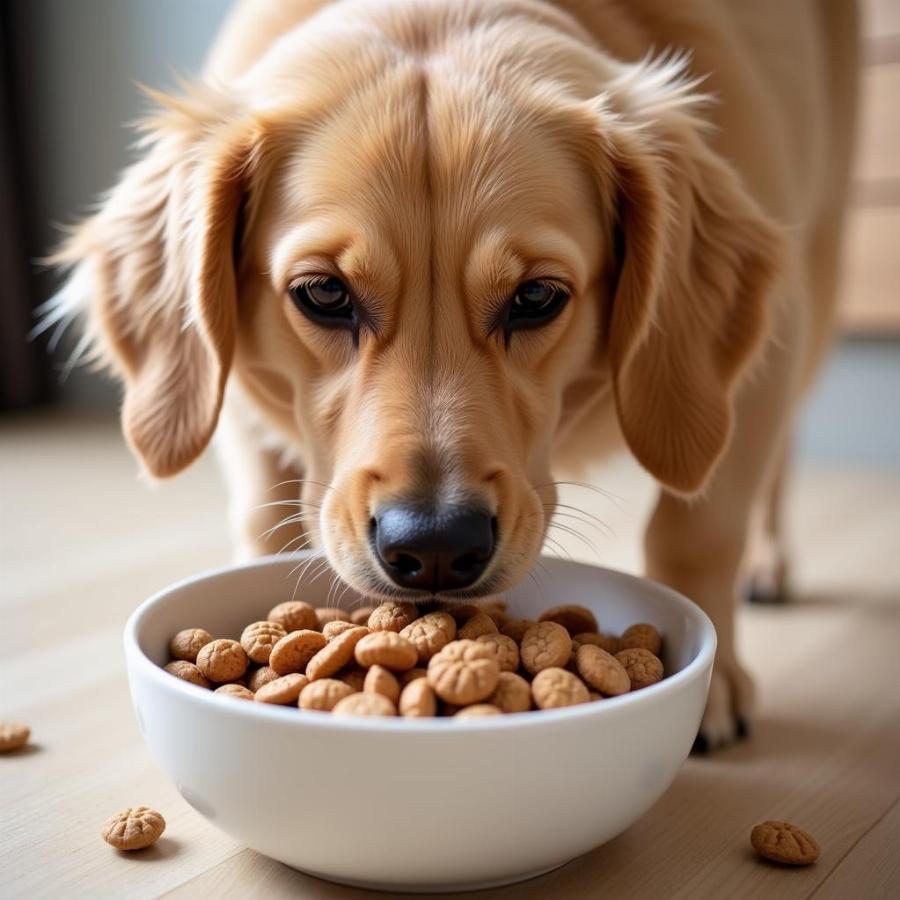When your beloved canine companion vomits undigested food, it’s naturally a cause for concern. Dogs and vomiting undigested food can be a sign of various underlying issues, ranging from simple dietary indiscretions to more serious medical conditions. Understanding the potential causes and knowing when to seek veterinary attention is crucial for ensuring your furry friend’s well-being. This article delves into the common reasons why dogs vomit undigested food, provides helpful tips for prevention, and guides you on when a trip to the vet is necessary.
Understanding Why Dogs Vomit Undigested Food
Several factors can contribute to a dog vomiting undigested food. One of the most common reasons is simply eating too fast. When dogs gulp down their food without chewing properly, large pieces can irritate their stomach, leading to regurgitation. Another frequent culprit is food intolerance or allergies. Just like humans, dogs can have adverse reactions to certain ingredients, causing digestive upset and vomiting. Furthermore, underlying medical conditions such as inflammatory bowel disease, pancreatitis, or even obstructions in the digestive tract can manifest as vomiting undigested food.
 Chó ăn quá nhanh
Chó ăn quá nhanh
Is it Vomiting or Regurgitation?
It’s important to distinguish between vomiting and regurgitation. Vomiting is a forceful expulsion of stomach contents, often preceded by retching and nausea. Regurgitation, on the other hand, is a passive bringing up of undigested food from the esophagus, typically occurring shortly after eating. If your dog is regurgitating undigested food immediately after a meal, it could simply mean they ate too quickly. my dog eats too fast and doesn't chew explains how to address this issue. However, if vomiting is involved, it’s important to investigate the underlying cause.
When to Seek Veterinary Care for Dogs and Vomiting Undigested Food
While an isolated incident of vomiting undigested food might not be cause for immediate alarm, several signs warrant a trip to the vet. If the vomiting is frequent, accompanied by other symptoms like lethargy, loss of appetite, diarrhea, or blood in the vomit, seek professional help immediately. These could be indications of a more serious medical condition requiring prompt diagnosis and treatment.
Preventing Dogs from Vomiting Undigested Food
Several preventative measures can help reduce the likelihood of your dog vomiting undigested food. Feeding smaller, more frequent meals can prevent overeating and encourage slower eating habits. Puzzle feeders or slow-feed bowls can also be beneficial, forcing your dog to work for their food and eat at a slower pace. Additionally, choosing a high-quality, easily digestible diet that’s appropriate for your dog’s age, breed, and any existing health conditions is essential. digesstive enzymes for dogs can be helpful in aiding digestion. If you suspect a food allergy, consult your veterinarian about an elimination diet to identify the culprit ingredient.
Conclusion: Prioritizing Your Dog’s Digestive Health
Dogs and vomiting undigested food is a common issue that can stem from various causes, ranging from simple overeating to underlying medical conditions. By understanding these potential causes and implementing preventative measures, you can help ensure your canine companion’s digestive health. Always remember to consult your veterinarian if you notice persistent or concerning symptoms, as they can provide the best guidance and care for your beloved pet.
FAQ:
- How can I tell if my dog is vomiting or regurgitating? Vomiting is forceful and often preceded by retching, while regurgitation is a passive bringing up of food.
- What should I do if my dog vomits undigested food once? Monitor your dog for other symptoms. If it’s an isolated incident and your dog seems otherwise fine, it may not be cause for immediate concern.
- Are certain dog breeds more prone to vomiting undigested food? Some deep-chested breeds can be prone to a condition called bloat, which can cause vomiting.
- Can stress cause a dog to vomit undigested food? Yes, stress can upset a dog’s stomach and lead to vomiting.
- What are some common food allergens for dogs? Common allergens include beef, chicken, dairy, wheat, and soy. can dogs have poppy seed muffins and can dogs have sucralose address specific food concerns.
- Is it okay to give my dog over-the-counter medication for vomiting? No, always consult your veterinarian before giving your dog any medication.
- What should I feed my dog after they vomit undigested food? Offer small amounts of bland food, such as boiled chicken and rice, once the vomiting has subsided.
Other articles you might find helpful: dog eating deer poop
Beaut Dogs: Your Trusted Source for Canine Care
Beaut Dogs is your one-stop resource for all things canine. We provide expert advice and in-depth information on dog breeds, care, health, and training. When you need assistance, don’t hesitate to contact us via Email: [email protected] for detailed and accurate answers. We’re here to help you navigate the wonderful world of dog ownership.